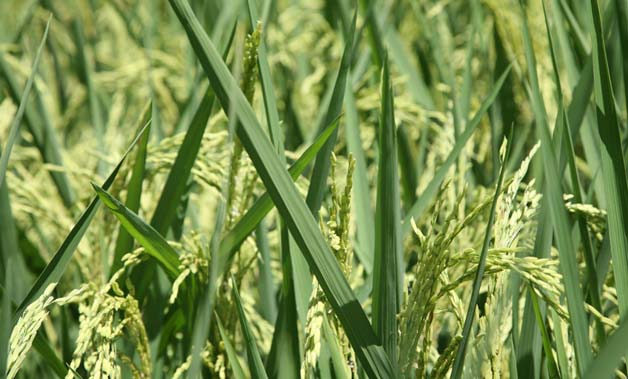SUPA BC – The rice variety with benefits
How a nuclear technique is helping farmers in Zanzibar.
SUPA BC has more tillers, which are grain bearing branches, than other rice types and the yield is up to seven tonnes per hectare, compared to the four tonnes the farmers get from other varieties. It also adapts well to fertilizer and its short height makes it easier to cultivate.
Whether boiled, fried, mixed with coconut milk or spiced with cloves, rice is a common feature at meal times in Zanzibar.
In fact, the island’s appetite for rice is so large that farmers cannot grow enough to meet demand and 80 per cent of rice consumed needs to be imported.
But according to agricultural experts, Zanzibar, which lies off the coast of Tanzania, has the right conditions to produce much more rice.
“Rice is the preferred food crop in Zanzibar,” says Khatib Juma Khatib, the Rice Research Programme Coordinator at Zanzibar’s Agricultural Research Institute (ZARI) located at Kizimbani. “The demand is there and we do have the potential to grow more.”
Zanzibar’s Ministry of Agriculture and Natural Resources has a Rice Development Strategy to try to increase rice production by developing irrigation systems, training farmers and introducing improved varieties of rice.
The island’s rice improvement projects are being supported by the IAEA through the provision of equipment, training and a nuclear technique known as mutation induction.
This plant breeding method, which dates back to the late 1920s, uses radiation to bring about mutations in a seed’s DNA.
Mutation is a natural process. When dependent on spontaneous mutations, caused by natural environmental factors, such as cosmic rays, it can take millions of years. Gamma rays, emitted from a radioactive source safely shielded in an irradiator, can speed up this process.
After seeds have been irradiated, they are planted at experimental sites for several years. The plants are carefully monitored by the breeders, who are looking for particular improvements.
These could be disease resistance, a tolerance to a high level of salinity in soil or the potential for more plentiful crops.
Once an improved line has been identified, tested and officially approved, it is released as a new variety.
With the support of the IAEA, through its technical cooperation programme and in partnership with the UN’s Food and Agriculture Organization (FAO), Zanzibar has put this technique to good use and a new variety of rice known as “SUPA BC” was released in 2011.
The seeds were originally irradiated at the FAO /IAEA Plant Breeding and Genetics Laboratory in Seibersdorf, Austria.
According to Khatib Juma, SUPA BC is proving to be a hit with farmers and consumers: “SUPA BC is very popular because it has several advantages over other rice varieties. For example, it is very high-yielding.
“Normally the rice varieties we grow here produce four tonnes per hectare, but with SUPA BC the potential yield is seven tonnes per hectare. In addition, it tastes good and has a pleasant aroma.”
In the village of Kibokwa in northern Zanzibar, Juma Mohammed is one of many rice farmers enjoying the benefits that SUPA BC brings.
“I’ve been growing rice for around 20 years and currently cultivate eight varieties. SUPA BC is very, very good, it’s one of the best,” says Juma, adding: “Because it has such a high yield, I mainly grow it for selling and I can make a lot of money out of this variety.”
Despite the popularity of the new variety, the plant breeders at the Zanzibar Agricultural Institute are now looking for an even better one.
In spite of its qualities, SUPA BC still has a weakness. It is susceptible to a disease known as the Rice Yellow Mottle Virus (RYMV), which can lead to major losses in rice fields.
In order to develop a new mutant variety with resistance to RYMV, SUPA BC seeds were irradiated in 2012 at the FAO/IAEA laboratory. Using these seeds, six new rice lines have been planted at the institute in Kizimbani and are used for further breeding.
A new biotechnology laboratory has been equipped with equipment that has been provided through the IAEA’s technical cooperation programme.
Research will be conducted here to find the rice plants that contain the gene responsible for resistance to the virus.
Khatib Juma says: “The IAEA also helps us with capacity building. Through the Agency’s support we can visit international centres to take part in training courses.
“This means we can gain experience from these institutions that we can use in our own plant breeding activities.”
Zanzibar is often thought of as a place to enjoy a taste of tropical paradise, with white sandy beaches fringed with palm trees.
But the island’s economy is based on agriculture, using traditional farming methods and providing the main source of income for around 70 percent of the 1.3 million people who live here.
“Daily life can be hard for people here. We have food security issues and employment problems too. Those beaches and hotels on the east coast are mainly for the tourists,” says Khatib Juma.
By increasing the local production of rice through the introduction of improved and new varieties, Zanzibar can reduce its dependence on imports, save money and create more jobs.
About the IAEA
The International Atomic Energy Agency (IAEA) serves as the world’s foremost intergovernmental forum for scientific and technical co-operation in the peaceful use of nuclear technology. Established as an autonomous organization under the United Nations (UN) in 1957, the IAEA carries out programmes to maximize the useful contribution of nuclear technology to society while verifying its peaceful use.











